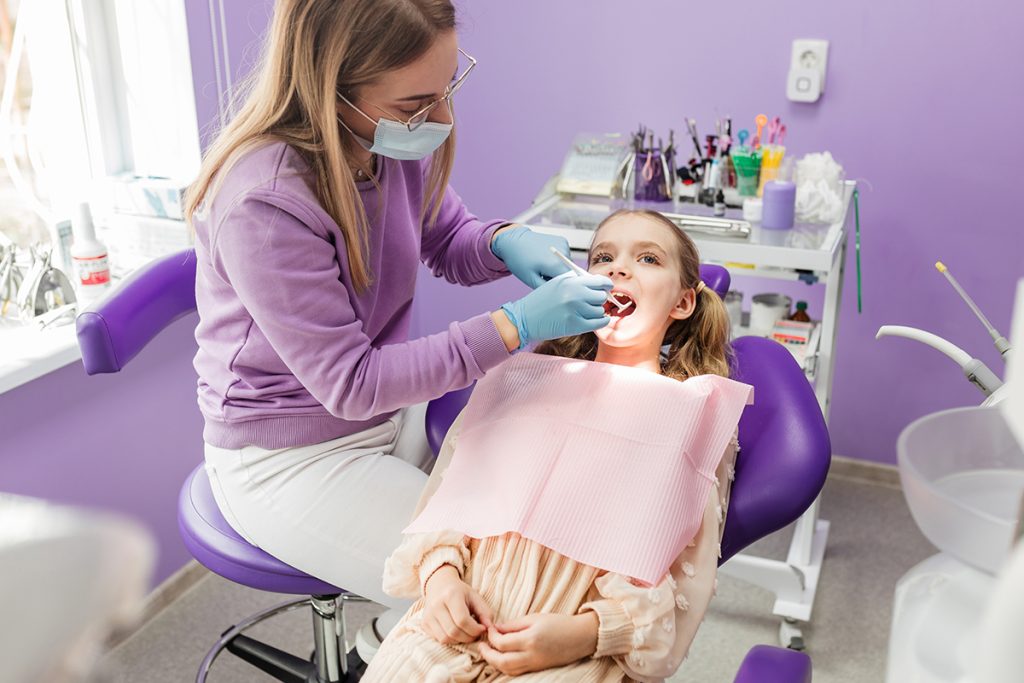
Pediatric dentistry is dedicated to the oral health of children, from infancy through their teenage years. Early dental care is crucial for establishing healthy habits, preventing dental issues, and ensuring the proper development of teeth and gums. A pediatric dentist focuses on creating a positive experience for young patients while educating parents and children on the importance of maintaining good oral hygiene. Regular visits to a pediatric dentist ensure that children receive the preventive care they need for a lifetime of healthy smiles.
The Importance of Early Dental Visits
It’s recommended that children visit the dentist as soon as their first tooth erupts, or by their first birthday, whichever comes first. Early visits help establish a foundation for good oral health habits and allow the dentist to monitor the development of teeth and gums. Regular check-ups also provide an opportunity for the dentist to identify any potential dental issues, such as misalignment, cavities, or gum problems, before they become serious. Establishing a dental care routine early on can reduce anxiety about dental visits and foster positive associations with dental care.
Key Services of Pediatric Dentistry
Routine Check-ups and Cleanings
Regular check-ups and cleanings are vital for maintaining children’s oral health. During a check-up, the pediatric dentist will examine the child’s teeth, gums, and overall oral health, checking for early signs of cavities, misalignment, or other issues. Cleanings help remove plaque and tartar build-up, which can contribute to cavities and gum disease. These visits also offer the opportunity to discuss good brushing and flossing techniques and to ensure that children are properly caring for their teeth at home.
Fluoride Treatments
Fluoride is a natural mineral that helps strengthen enamel and prevent cavities. Fluoride treatments are often recommended for children as part of preventive dental care, especially for those at higher risk of cavities. The treatment is quick, non-invasive, and helps provide extra protection to the developing teeth. Fluoride can be applied in the form of a gel, foam, or varnish, and the dentist will determine the right frequency based on the child’s dental health and needs.
Dental Sealants
Dental sealants are a protective coating applied to the chewing surfaces of back teeth, where cavities are most likely to develop. The thin plastic layer acts as a barrier, preventing food particles and bacteria from getting trapped in the grooves of the teeth. Sealants are typically applied to children’s permanent molars once they emerge, providing long-term protection against cavities, especially in those hard-to-reach areas. This preventive measure can significantly reduce the likelihood of tooth decay.
Cavity Fillings
While preventive care can minimize the risk of cavities, children may still experience tooth decay. When cavities form, it’s essential to address them promptly to prevent further damage. Pediatric dentists use tooth-colored fillings to restore the affected tooth, ensuring that it functions properly and blends naturally with the rest of the smile. Early intervention helps prevent more extensive treatments later and ensures that the child’s teeth stay healthy and intact.
Orthodontic Evaluations
Although not all children will need braces, it’s important to monitor the development of their teeth and bite. Pediatric dentists often conduct early orthodontic evaluations to detect potential issues such as overcrowding, misalignment, or bite problems. Early intervention can guide the proper development of teeth and jaw, preventing more complex orthodontic treatments in the future. If necessary, the pediatric dentist will refer the child to an orthodontist for further assessment and treatment options.
Treatment for Thumb Sucking and Pacifier Use
Thumb sucking and pacifier use are common behaviors in young children, but if these habits persist beyond a certain age, they can affect the alignment of the teeth and jaws. Pediatric dentists can provide guidance to help children break these habits and prevent long-term dental issues. Early intervention helps ensure that the child’s teeth and jawbones develop correctly and that any potential problems are addressed before they become more difficult to treat.
Emergency Dental Care for Children
Dental emergencies can happen at any time, especially with active children. Whether it’s a knocked-out tooth, a broken tooth, or severe tooth pain, pediatric dentists are equipped to handle urgent dental issues. Prompt treatment is essential to reduce pain, prevent further damage, and ensure that the child’s dental health is restored. Emergency care for children may include re-implanting a knocked-out tooth, repairing broken teeth, or addressing infections that could lead to more serious complications.
Promoting Healthy Habits for Life
A key aspect of pediatric dentistry is teaching children and parents about the importance of good oral hygiene habits. From a young age, children should be encouraged to brush their teeth twice a day, floss regularly, and avoid sugary snacks and drinks that can contribute to cavities. Pediatric dentists provide parents with tips and guidance on creating an effective oral care routine for their children, helping them develop lifelong habits that promote good dental health and prevent future problems. Regular visits to the pediatric dentist also help reinforce the importance of maintaining healthy teeth and gums throughout childhood and beyond.

